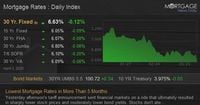Mortgage rates experienced a significant drop on Thursday, April 3, 2025, following the Trump administration's announcement of a sweeping 10% tariff on all imported goods. The average rate for a 30-year fixed mortgage fell 12 basis points to 6.63%, marking the lowest level since October, according to Mortgage News Daily. This decline came amidst a broader sell-off in the stock market, which drove investors towards the bond market, subsequently causing bond yields to decrease.
Matthew Graham, chief operating officer at Mortgage News Daily, noted, "While plenty of uncertainty remains over the finer points of Wednesday afternoon's tariff announcement, markets have heard enough to brace for impact on global trade." This environment has created a paradox for potential homebuyers. Despite the drop in mortgage rates, affordability remains a pressing issue.
For the four weeks ending March 30, 2025, the typical monthly payment for U.S. homebuyers reached a staggering $2,802, according to Redfin, making it the second consecutive week at a record high. Sale prices have also risen by 3.4% year-over-year, with the weekly average mortgage rate hovering around 6.65%, which is still more than double the lows seen during the pandemic.
Approximately 70% of households, equating to about 94 million Americans, are unable to afford a $400,000 home, while the estimated median price of a new home stands at around $460,000 in 2025, as reported by the National Association of Home Builders. The minimum income necessary to purchase a $200,000 home at a 6.5% mortgage rate is $61,487, but in 2025, around 52.87 million households are estimated to have incomes below this threshold, limiting their purchasing power to homes priced up to $200,000.
Despite these challenges, there is a slight increase in housing supply. March 2025 saw a 10% annual rise in new listings, with active listings up approximately 28% year-over-year, according to Realtor.com. However, pending sales, which represent signed contracts on existing homes, fell by 5.2% from March 2024 in the largest metropolitan areas. The steepest declines were observed in Jacksonville, Florida, and Miami, which experienced decreases of 15.1% and 13.7%, respectively. Virginia Beach, Virginia, also saw a notable 14.2% decline.
Danielle Hale, chief economist for Realtor.com, commented, "The high cost of buying coupled with growing economic concerns suggest a sluggish response from buyers in early spring. We're seeing a market that's rebalancing, offering more choices for shoppers." She added that recent improvements in mortgage rates could bode well for the later spring and early summer housing season, provided economic concerns do not deter buyers.
In a related report, Freddie Mac noted a slight decrease in mortgage rates, with the average rate for the benchmark 30-year fixed mortgage falling to 6.64% from 6.65% the previous week. This is a notable change from a year ago when the average rate on a 30-year loan was 6.82%. The average rate for a 15-year fixed mortgage also dropped to 5.82%, down from 5.89% last week.
Experts are closely monitoring the potential impacts of Trump's proposed tariffs on the housing market. The tariffs, which include steeper duties on specific countries, such as a 35% tariff on imports from China and 24% on Japanese goods, could have inflationary effects that might counteract the recent drop in mortgage rates. Nicole Rueth, senior vice president at Movement Mortgage, stated, "Buyers waiting for 3% rates again are wasting time. Those days are gone." Meanwhile, Danielle Hale reassured that inflation from tariffs might not be the primary factor influencing interest rates.
Redfin's housing economist, Chen Zhao, predicted that core inflation, currently at 2.8%, could rise to between 3.5% and 4% by the year's end due to the new import taxes. This potential inflation could complicate the Federal Reserve's plans to cut rates, which are anticipated to begin as early as June.
Melissa Cohn, regional vice president of William Raveis Mortgage, expressed concern over the economic repercussions of the tariffs, stating, "The announcement of the new tariffs has caused the equity markets to tank, and bond yields have also fallen significantly as the markets fear that the steeper-than-expected tariffs will set off a global trade war and damage the economy." She noted that while mortgage rates are currently decreasing, the long-term outlook remains uncertain.
As the market adjusts to the new tariff regime, the relationship between mortgage rates and the broader financial landscape remains delicate. The recent volatility in the stock market has led investors to seek safer assets, driving bond yields lower and, consequently, mortgage rates down as well. However, the uncertainty surrounding Washington's policies may prevent rates from falling significantly further.
Dan Richards, president of Flyhomes Mortgage, highlighted that while falling yields could push mortgage rates down, the ongoing uncertainty means rates may not decline as quickly or as significantly as some hope. He remarked, "Despite expectations of rate cuts later this year, the Fed’s stance remains cautious, even restrictive." This tension between falling yields and persistent risks suggests that mortgage rates may take a more cautious path downward.
In summary, the housing market is currently at a crossroads. While the drop in mortgage rates provides a glimmer of hope for potential buyers, the ongoing challenges of affordability, economic uncertainty, and inflationary pressures from tariffs complicate the landscape. As the spring housing season unfolds, all eyes will be on the interplay between these factors and their impact on homebuyers' decisions.







